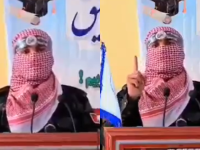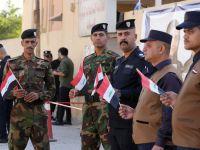Israeli Prime Minister Ehud Barak held more talks with potential political allies Tuesday to try to cobble together an emergency government after almost four weeks of bloodletting in the Palestinian territories that has put peacemaking on hold.
"In the current emergency situation we must unite as brothers and surmount political quarrels," Barak said, accusing Palestinian leader Yasser Arafat of choosing the "path of conflict," which he warned would achieve nothing.
Barak had been expected to hold talks with his hawkish adversary, Ariel Sharon, later Tuesday following a first meeting the day before on forming a national unity government. But neither Sharon's Likud party nor the prime minister's office would confirm that a meeting would take pace.
"There is no meeting scheduled at the moment, but one could be arranged later," a Barak spokeswoman told AFP.
Barak's efforts to woo Likud have so far stumbled over demands by Sharon, the hardline former defense and foreign minister, for the right to a veto over any resumption of peace talks with the Palestinians.
"What is important for me is to have a real influence on the political process," Sharon told army radio.
The Palestinians and dovish members of Barak's own cabinet warn that Sharon's inclusion in an enlarged government would signal the death knell for the seven-year-old Middle East peace process.
And the Israeli army said Tuesday it was preparing for a long campaign of violence in the Palestinian territories, which to date has killed 138 people, all but a handful of them Arabs.
Sharon is blamed by the Palestinians for setting off the tide of deadly unrest engulfing the West Bank and Gaza Strip with a September 28 visit to the al-Aqsa mosque compound in Jerusalem's Old City, a site revered by both Jews and Muslims.
"The formation of such government will kill the peace process," Zakariyah al-Aghah, a member of the PLO executive committee, told Voice of Palestine radio. "Bringing Sharon into the government means more Palestinian sufferings and practices against our people.
"In such a situation, we will adopt all necessary measures on the internal level. We may establish a new Palestinian government that is appropriate to the new situation," he added, without elaborating.
Barak is hoping to pull together a government before parliament returns from its summer recess on October 30 and could consider a bill for early elections.
He kicked off a round of negotiations with Sharon on Monday, the day after he declared a unilateral freeze in peace talks with the Palestinians following a hostile Arab summit at the weekend.
The prime minister, who has been leading a minority government for more than three months, also held talks Tuesday with other potential allies from across the political spectrum, including the right-wing National Religious Party, the staunchly secular Shinui and the ultra-Orthodox United Torah Judaism.
This followed similar meetings a day earlier with the left-wing Meretz party and the powerful ultra-Orthodox Shas party, the latter of which said it rejected Barak's offer to join a unity government but would support it from outside.
Barak presented Sharon with a seven-point document, including a clause stipulating that any proposal for a revival of peace talks be discussed by the security cabinet and then put to a full government vote if there were differences.
This has been rejected outright by Sharon, who is demanding a right of veto over such steps.
Former prime minister Benjamin Netanyahu, widely touted to be plotting a political comeback, backed the national unity talks but emphasised that the coalition be for a limited period only.
"As soon as the danger posed by the Arab violence has passed, the people have to be allowed to choose between the path of continual concessions or our way, based on deterrence," he said.
Netanyahu, who quit politics after losing the May 1999 elections to Barak, is currently riding high in the opinion polls, which put him ahead of both Barak and Sharon in the popularity stakes -- JERUSALEM (AFP)
© 2000 Al Bawaba (www.albawaba.com)







